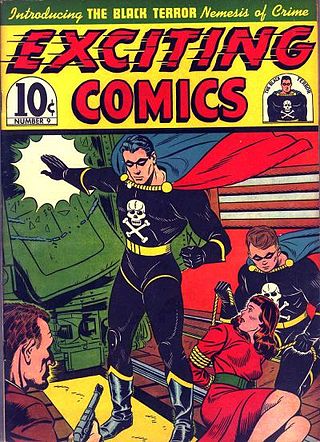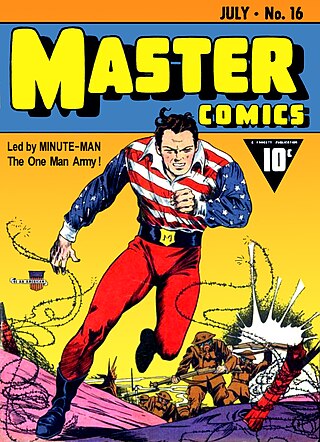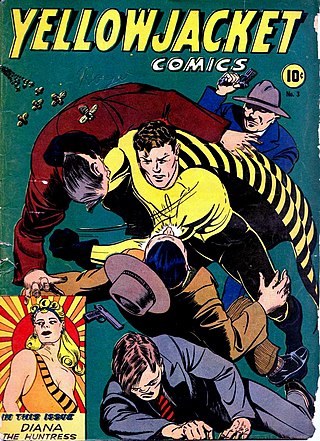Related Research Articles

The Human Torch, also known as Jim Hammond, is a superhero appearing in American comic books published by Marvel Comics. Created by writer and artist Carl Burgos, he first appeared in Marvel Comics #1, published by Marvel's predecessor, Timely Comics.
Thor, the god of Norse mythology, has appeared as a character in various comics over the years, appearing in series from a range of publishers.

Miss America is a superhero appearing in American comic books published by Marvel Comics. Created by writer Otto Binder and artist Al Gabriele, the character first appeared in Marvel Mystery Comics #49 in the Golden Age of Comic Books. Madeline Joyce is the first incarnation of Miss America. The character has also been a member of the Invaders, Liberty Legion, and All-Winners Squad at various points in her history.
The American Crusader is a superhero who originally appeared in Thrilling Comics #19. He appeared in almost every issue until #41.

The Black Terror is a fictional comic book superhero debuting in Exciting Comics #9, published by Nedor Comics in January 1941. The character was popular and, on the strength of the Black Terror's sales, Nedor made Exciting Comics a monthly magazine starting with issue #11.

The Shield is the name of several superheroes created by MLJ. Appearing months before Captain America, the Shield has the distinction of being the first superhero with a costume based upon United States patriotic iconography. The character appeared in Pep Comics from issue #1 to #65.

Minute-Man is a superhero appearing in comics published Fawcett Comics and later DC Comics.

Cat-Man and Kitten are a pair of fictional superhero characters created by artists Irwin Hasen (Cat-Man) and Charles M. Quinlan (Kitten) with unknown writers. Cat-Man was first published in 1940 by various Frank Z. Temerson companies. Due to circumstances during World War II, an altered version of Cat-Man was published in Australia and reprinted in the 1950s. AC Comics later revived the characters in the 1980s.

The Fighting Yank is the name of several superheroes, first appearing in Startling Comics #10.

The Blonde Phantom is a fictional masked crime fighter appearing in American comic books published by Marvel Comics. Created for Marvel predecessor Timely Comics by Stan Lee and Syd Shores, the character first appeared in All Select Comics #11, during the 1940s period fans and historians call the Golden Age of Comic Books. The heroine was so well received that the next issue was retitled The Blonde Phantom. The series continued to feature her until issue #22. She also appeared in backup stories in many other Timely comics; in Superhero Comics of the Golden Age, Mike Benton observes that "for a few months in 1948, readers could find her in seven titles on the newsstand." In The Supergirls, Mike Madrid asserted, "Once again, a capable woman hid behind a meek persona and only let her hair down, literally, to come to the aid of a man who completely ignored her unless she assumed a disguise. In a 1947 story entitled "I Hate Myself", Louise even dreams that Mark finally confesses his love for her, only to have the Blonde Phantom persona appear and steal him away."

Yellowjacket is a fictional super-hero, and the first to be published by the company that would become Charlton Comics. He first appeared in Yellowjacket Comics #1.
The Green Mask is the name of two comic book superheroes, both published by Fox Feature Syndicate. Both are in the public domain with some of the original stories having been reprinted by AC Comics.

Amazing-Man is a comic book superhero whose adventures were published by Centaur Publications during the 1930s to 1940s in the Golden Age of Comic Books. Historians credit his creation variously to writer-artist Bill Everett or to Everett together with Centaur art director Lloyd Jacquet. Amazing-Man first appeared in Amazing-Man Comics #5 —there were no issues numbered #1–4).

Samson is a superhero who appeared in comic books published by Fox Feature Syndicate. He first appeared in Fantastic Comics #1. The writer was uncredited, but is believed to be Will Eisner; the artist was Alex Blum, using the pseudonym "Alex Boon".

Miss Masque is a fictional masked crime-fighter. She originally appeared in comic books published by Nedor Comics, and was later revived by AC Comics, America's Best Comics, and Dynamite Entertainment.

The Woman in Red is a fictional character that first appeared in the period known to comic book historians as the Golden Age of Comic Books. Created by writer Richard E. Hughes and artist George Mandel, she first appeared in Thrilling Comics #2, published by Nedor Comics. The character was later revived by writer Alan Moore for America's Best Comics. She would also be used by Dynamite Entertainment in Project Superpowers Chapter Two.
The American Eagle is a superhero from the Golden Age of Comics. He first appeared in America's Best Comics #2, published by Nedor Comics, an imprint of Standard Comics.
The Magnet is a fictional character from the Golden Age of Comics. He first appeared in the Complete Book of Comics and Funnies #1 (1944), published by Nedor Comics. The character was later revived by writer Alan Moore for America's Best Comics.

Superhero fiction is a subgenre of speculative fiction examining the adventures, personalities and ethics of costumed crime fighters known as superheroes, who often possess superhuman powers and battle similarly powered criminals known as supervillains. The genre primarily falls between hard fantasy and soft science fiction in the spectrum of scientific realism. It is most commonly associated with American comic books, though it has expanded into other media through adaptations and original works.

The Green Turtle is a superhero originally published by Rural Home Publications. He first appeared in Blazing Comics (1944), and was created by Chinese-American cartoonist Chu F. Hing. While the original run of the character lasted only five issues, the Green Turtle is notable for two factors. First, during WWII, the stories represented the Chinese in U.S. popular media as heroic partners fighting the Axis. One issue begins with the banner 美國及中華民國, and features a U.S. general joining Chinese guerrillas in battle. During the war, U.S. depictions of the Pacific theatre were typically racialized; the "Yellow Peril" stereotypes applied to the Japanese were originally anti-Chinese and portrayed Asians as racial enemies of Western civilization. Second, the character is often identified as the first Asian-American comic book hero. These factors inspired a contemporary graphic novel on the Green Turtle, Shadow Hero, by Gene Luen Yang, whose American Born Chinese was the first work in a comics format to be nominated for the National Book Award.
References
- ↑ Benton, Mike (1992). Superhero Comics of the Golden Age: The Illustrated History . Dallas: Taylor Publishing Company. p. 161. ISBN 0-87833-808-X . Retrieved 8 April 2020.
- ↑ Mitchell, Kurt; Thomas, Roy (2019). American Comic Book Chronicles: 1940-1944. TwoMorrows Publishing. p. 99. ISBN 978-1605490892.
- ↑ Nevins, Jess (2013). Encyclopedia of Golden Age Superheroes. High Rock Press. pp. 90–91. ISBN 978-1-61318-023-5.
- ↑ Mougin, Lou (2020). Secondary Superheroes of Golden Age Comics. McFarland & Co. pp. 362–363. ISBN 9781476638607.
- Dynamic Man profile (Archived August 5 2011 at the Internet Archive)